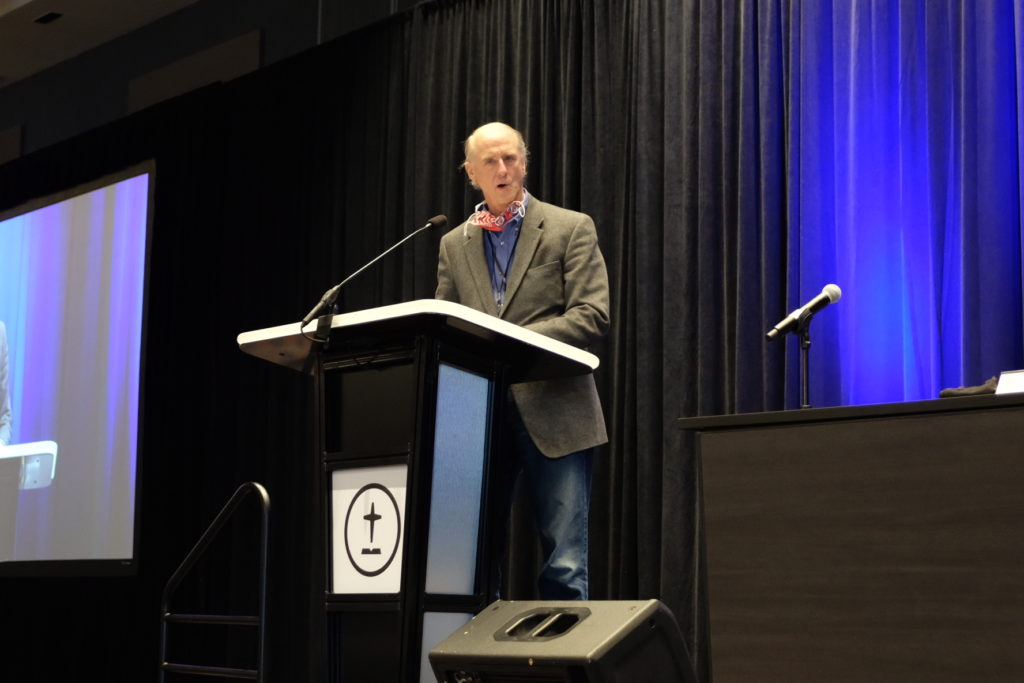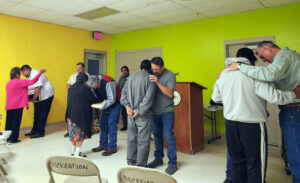
NASHVILLE (BP) – A dispute about whether a Southern Baptist entity can suspend trustees for misconduct will be studied by a task force formed by the SBC Executive Committee’s Committee on Missions and Ministry.
Rob Showers, chairman of the Committee on Missions and Ministry, announced the task force’s formation Tuesday (Feb. 23), during a plenary session of the EC. He said more time was needed to study the issue, which had sparked a brief but spirited discussion during a committee meeting earlier in the day.
The disagreement arose last fall, when Southwestern Baptist Theological Seminary suspended trustees Charles Hott and Thomas Pulley while investigating allegations of misconduct. It had played out largely in letters between attorneys representing the Executive Committee and those representing Southwestern, then spilled into the EC’s meetings Monday and Tuesday and now will continue in the form of a task force.
In a letter to Southwestern last November, EC attorneys wrote that suspension was “equivalent to removing the trustees from office” – a right reserved solely for the SBC, and exercised by messengers to annual meetings. According to the letter, the EC’s officers wanted Southwestern to rescind the suspensions or acknowledge “the action was null and void.”
In reply, attorneys representing Southwestern said the suspensions were not only allowed by the seminary’s bylaws, but were necessary to allow the entity to govern itself, and accused the EC of overreach. On Monday (Feb. 22), Southwestern President Adam W. Greenway told the Biblical Recorder the issue was “bigger than Southwestern,” and went “to the heart of historic Southern Baptist polity.”
After the task force was announced, Greenway told Baptist Press he was “hopeful for constructive engagement by this task force … with the key stakeholders related to clarifying and strengthening understandings of our polity, entity governance and trustee accountability in any and every way in which we can better serve our convention of churches.”
Showers, who will appoint members of the task force, said his desire is to get input from various entities. He said there wasn’t time to reach a decision during the two-day EC meeting.
“We needed to talk with seminary presidents, with [general counsels] of all the [entities] … and get everybody’s opinion,” Showers said. “It’s not a complicated question, but it has a lot of ramifications.”
Hott and Pulley were suspended after Southwestern and Baylor University filed suit against the Harold E. Riley Foundation, alleging they helped lead a “secret coup” to “seize control” of the charitable foundation – altering its purpose, stripping the schools of their rights and status as beneficiaries and misappropriating assets worth millions of dollars.
The Texas attorney general intervened in the case on behalf of the schools. The lawsuit was settled Feb. 8, after several days of testimony in a temporary injunction hearing. The settlement effectively returned control of the Riley Foundation to the schools.
Under terms of the settlement, the foundation’s trustees – including Hott and Pulley – resigned from those positions and agreed “not to seek or accept” future employment by or service to any SBC entity or Texas charity. Fellow Riley Foundation trustees Mike Hughes, a former vice president at Southwestern who was the Riley Foundation’s president, and Augie Boto, former executive vice president of the SBC Executive Committee, agreed to the same terms.
Pulley had already resigned his position on the Southwestern board. As part of the settlement, Hott acknowledged that he was “no longer a trustee of SWBTS.”
But even after the specific issue had been solved, the dispute continued – including more memos and letters as the EC meetings approached.
In a letter sent Sunday (Feb. 21), Southwestern’s attorneys wrote to EC members that the school did not remove the trustees, and that the suspensions were allowed “in accordance with its governing documents and parliamentary procedure to address trustee misconduct.” The suspensions, according to the letter, were “fully authorized by the Seminary’s Bylaws in connection with allegations of trustee misconduct,” and “were in no way contrary to any bylaws of the Southern Baptist Convention.”
But in a letter sent Friday (Feb. 19) to EC members in preparation for the EC meeting, the EC’s attorneys continued to assert that suspension equals removal. Showers, who is an attorney from Virginia, told Baptist Press on Tuesday he shares that opinion.
“Suspending with[out] voting rights, by any state law, I believe would be removal, and so do our attorneys,” Showers said.
The letter sent to EC members Sunday by Southwestern also claimed that last fall, the school “discovered that Mr. Boto was communicating with” the EC’s attorneys. It noted that despite Boto’s past employment history, he was “not a neutral actor in this case.”
In the Feb. 19 letter, the EC’s attorneys wrote that they had been contacted last October by Hott, who said he had been given their contact information from Boto. Hott, they wrote, told them he and Pulley “were expecting to be excluded” from an upcoming meeting of Southwestern’s board of trustees.
According to Showers, the task force’s focus will be to determine a “clear path” forward.
“Where there is trustee misconduct,” he said, “we need to figure out: how do we balance the sole membership interest of the SBC with the ability of entities to manage their own affairs and deal with that specific (issue of trustee) misconduct.”
The task force would report to the Committee on Missions and Ministry either at the next EC meeting or at a special called meeting.
“The question comes when discipline doesn’t work and you’ve got a really bad actor and you can’t wait for the [SBC annual meeting],” Showers said. “What do you do? And that’s really the question.”

















